

Lost in myth: Discovering you’re really from “Across the Sea”
In “Across the Sea,” Lost finally gives us the origins story for Jacob and the Man In Black. The episode was pure, 100% mythology. Those who watched the episode based on the surface story alone were probably disappointed. Let’s face it, taken literally, myths are silly: talking snakes, little boys defeating giants, jealous gods, immaculate conceptions, mortals with superpowers, a sword stuck in a stone, the Force, Never Never Land, Wonderland, Oz, the Matrix, the Island. On the surface, all myths seem like children’s stories. It’s only when we dig deeper that we find the truth worthy of a wise old soul — a soul that knows where it really came from.
In my writings, presentations, and conversations, I’ve often made the point that the island on Lost is a metaphor for the world we live in. Like our world, the island contains a diverse population of inhabitants; these inhabitants are always fighting; there are ancient peoples who are more in tune with the land; there is a power that guides the island residents through challenges to reach their destinies; and lastly, the island is in danger of being destroyed. There are many spiritual similarities too — like everyone being connected, everything happening for a reason, the power of leaps of faith, and clues given to help those who are lost find their paths. There’s no doubt that there are similarities.
Still, this season, the island seems to be less of a metaphor for our world, and more of a metaphor for the world beyond ours — the heavenly realm or the Garden of Eden — the place where we came from and from where we will hopefully return when we die. Does this render all of its parallels to our world null and void? Not at all. One of the major principles of Kabbalah is “as above, so below,” meaning that whatever happens on our earthly realm corresponds with a happening from the celestial plane. This concept is echoed in the “Lord’s Prayer” where Jesus is alleged to have said, “Thy will be done on earth as it is in heaven.” In Lost, one can read this wisdom from one of its primary mantras: that “whatever happened, happened.” The idea is that whatever happens on one plane (the island/heaven) will happen in another (off-island or sideways flash/earth). Since Lost has been hitting us over the head with the reflections of the main characters in the sideways flashes this season, it seems almost inevitable that this theme will play into its final revelation. For now though, the point is that whether the island is a microcosm of our world, or heaven, is irrelevant because either way the metaphor works. It’s interchangeable since one reflects the other, and vice-versa.
Personally, I believe that the programming code of our world first exists in the heavenly realm and then is enacted here, on the game board of earth. We can get all philosophical and quantum physical about it, but it really is quite simple. Our world is just like a video game. The game has its coded program that is experienced when you play it. The reason it was so easy for me to plug the simulation metaphor from The Myth of Lost book into the mysteries of Lost is because they both share the exact same myth. It is the same myth as Alice in Wonderland, The Wizard of Oz, and yes, even The Matrix — that the world we live in is an illusion created so that we could experience the adventure of life. In the real world, we are all one, all-knowing, and all there is, so there is nothing to experience. We created this world so that we could experience the one thing we could not know — what it was like to not be us! That’s it. End of story. Congratulations, you now have the answers to everything. Now we can all live life without trying to keep everything for ourselves and killing anyone that gets in our way.
Oh please, I hear the most skeptical among you echoing through the illusion of time, stop pretending you have all the answers! We all have all the answers. In reality, there is no me or you or us. Everything is everything. Our souls already know all there is to know, but we are reaching a stage where all will be made known to our conscious minds. Lost is helping us wake up from our very long slumber. The world is even giving us clues that align with exactly what is going on with the show. Was it a coincidence that a thick, black smoke from an island volcano recently downed planes and changed plans for millions around the world? How eerie is it that BP recently drilled so deep into the earth’s crust that they reached a major geyser that has spewed a seemingly unstoppable black oil into our ocean, threatened to destroy its delicate balance of life? Does this remind you of anything? How about the DHARMA initiative drilling so deep into the island that they released its inner-energy, causing an incident of epic proportions? Is there reason to be concerned here? “Across the Sea” gave us a huge clue.
In the episode, we finally learned what the energy of the island actually is…sort of. As the character known only as mother says, it is “life, death, rebirth, it’s the source, the heart of the island.” Why couldn’t babies be born on the island after the Incident? I think we just got our answer. The energy of life had been greatly depleted, leaving only enough for those who already had the light within them. As the mother said, there is “a little bit [of light] inside every man, but they always want more. They can’t take it, but they can put it out. And if it goes out here, it goes out everywhere.” I was almost expecting her to then turn to the camera and look at the audience and say, “even in your world.” I get a chill just thinking about that.
The chill is because this is exactly what is going on in our world right now. In spiritual circles, oil is considered to be the lifeblood of our planet, or literally, the blood of the living earth. It is its energy that we dig up to use for our own purposes. Much like DHARMA, we’ve just hit a pocket of energy that was too much for us to control. We’ve had our own Incident. We have risked the delicate balance of life in our oceans and our world as a whole. I have said that Lost is giving us clues about what is coming our way in our world and this incident is just one more confirmation of that. However Lost ends is likely to be a big indication of the events we can expect to be coming our way in the coming years ahead, culminating in 2012.
If you aren’t ready to accept that Lost is providing prophesy about our world, perhaps you can at least see the similarities between the show and your own life. Lost‘s messages work on a micro-level too. In my life, I have recently been put into a situation where I had to choose between two Lost finale events run by two opposing forces who managed to initially split up the group that I watch the show with. I first went with the more interesting, exciting, finale plan — to watch it underground in the oldest subway tunnel in the world that was recently unearthed — an underground hatch of sorts. Still, taking a tip from Sawyer, I decided to play both sides, and signed up for the more conservative but tried-and-true viewing so as to not get shut out. Now, I’m glad I did, for the other event is turning out to be something other than what it seemed. In fact, many of those who joined this side have since returned, including myself and the other candidates, aka, co-organizers of our group. The details are actually even more bizarre and you can read them here (see the second half of my post from May 11th).
Getting back to Lost, the episode was so chock-full of mythology and mythological movie references, I could probably write a whole book about just this episode alone. There was the Man In Black returning to the burned homes of his foster family echoing Luke returning to the burned home of his foster family in Star Wars (I wrote about this in “Dairy of a Layman #17: The Hero’s Journey”). There was Jacob drinking from the cup to accept the role of guardian of the island similar to Indiana Jones drinking from the Holy Grail in Indiana Jones and the Last Crusade (referenced in “Lost In Myth: Why LOST Can Be A Substitute For ‘Willy Wonka'”). There was also the Biblical blessing reference of this scene. In the Bible, Isaac’s son Esau, the first born, gives up his birthright blessing to his brother Jacob for a bowl of soup. Later, Jacob fools his blind father into giving him the blessing, making it official. In Lost, while Jacob was the first-born, he wasn’t deemed special like his brother was and commented to his mother how she had intended to give the blessing to him. His mother’s response was that it was always meant to be him (Jacob), and that she was able to see that now. In short, it was his destiny all along because it already had been written.
One movie theme that this episode of Lost really reminded me of, was that of the golden-light briefcase in Pulp Fiction. In the movie, both John Travolta’s and Samuel L. Jackson’s characters must retrieve a valuable possession of a gangster that is kept in a briefcase. While the contents of the briefcase are never fully explained, there are several hints as to what it is. When the briefcase is opened, a bright, golden glow emits from inside, shining on those peering at it in wonder. The scene was very reminiscent of Jacob and his brother looking at the glowing light coming from the cave on the island. From what I’ve heard from Pulp Fiction fans, the glowing content of the suitcase was supposed to be the mob boss’s soul, which he stole back from the devil who had taken it from him in exchange for his charmed life. Apparently, when the mob boss is seen from behind in the film, he has a bandage on the back of his neck, which is supposedly where his soul was taken from. I have to confess, I caught none of this when I had originally watched the movie sixteen years ago, and while Roger Ebert has dismissed it as an urban legend, I think the collective consciousness that created it gives it more credence than any other explanation I’ve heard.
On Lost, the bright, golden glow of the island’s source also seems to be something akin to a soul — only it is more like the soul of the entire island, and therefore, the world. This soul is the energy of life — the energy that powers the universe. In our world, this energy can be seen as oil. Where does oil come from? Organic matter. And where is it most concentrated? In the Middle East. And where was the lush, garden of Eden said to have originally been located on earth — between the Tigris and Euphrates rivers, located in the Middle East (due to the Great Flood, it is unlikely that these are the same as the original rivers, but they were still likely located in the Middle East). So what happened to all that lush, vegetation as time went on? It became oil — the lifeblood of our society.
Oil is but one metaphor for the energy of the island, but just a material-world one. On a more spiritual level, this energy relates more to the energy that runs through everything and connects us all. In Star Wars, it was called The Force. Some think of it as God or the light or energy. Since it is concentrated on the island though, the idea is that this light is what powers the entire world. Interestingly, this was similar to one of the theories for the show that I wrote about in The Myth of Lost. Take away the computer program stuff, and this got pretty close:
According to this theory, the Lost castaways discover that all of planet Earth is an illusionary program controlled by a gigantic computer. This gigantic computer is the Lost Island itself. Since the island controls everything that happens on the entire planet, it is able to bring exactly the people it needs to its shores for a very specific purpose — to help the scientists who keep the computer running (the Others), and to possibly breed the next generation who will take over once The Others are too old to continue.
Even though the details of this theory aren’t where the writers seem to be going, it still shares the same basic mythology with both Lost and the main theory in The Myth of Lost book. This angle makes sense to me and can easily translate to how our world may really work. The reason I wasn’t crazy about the whole “cork” explanation to the island that Jacob mentioned in “Ab Aeterno” was because it didn’t fit quite as well. I don’t see heaven or earth as being a cork to contain evil, yet, since these are the metaphors for what the island represents, I felt there was a disconnect. In “Across the Sea” we learn that Jacob was taking great liberties with his metaphor and that the island isn’t really a container for evil at all, but a source of life.
In “Lost In Myth: ‘Ab Aeterno’-Cadabra! And the Island Is…A Cork??“ I wrote, “The whole ‘cork’ thing might really just be the writers trying to reduce our expectations. But I do not believe the answer ends here.” I’m glad it didn’t, because the mythology of the island makes much more sense to me now. The island is the battery that powers the earth. Perhaps in doing so, it balances light and dark, good and evil, but its purpose is not solely to contain evil. In fact, as we have seen, the Man In Black is not evil, just someone who felt trapped and wanted to leave but wasn’t allowed to. If he became evil, it’s only because Jacob made him so, by knocking him out and forcing him into the Source where he would face a fate “much worse than death.” Hey, you’d be bitter too.
Representing the heavenly realm, there really is no good or evil on the island — all is one, just as it is beyond the illusionary world of opposites that we live in. Jacob’s mother tells him that he is good, but as we see, he sometimes does bad things like pushing his brother into the Source. Jacob’s mother also claims that he cannot lie, but sometimes a good person has to lie, like when they tell someone how good they look or that their ass isn’t too big or that they were just about to call. Being good, or seeing others as being that way, can also relate to just being sheltered or ignorant. The Man In Black brings this up when he points out that from where Jacob stands looking down on his people from above, he may assume they are good, but as someone who has lived among them, MIB knows better. Of course, here Jacob is being compared with God, looking down on us. And even in the Bible we see that our loving, caring, God can be a vengeful God, and that we should be God-fearing. This doesn’t sound like an all-good God to me. And in fact, it isn’t, because God is simply the aggregate of all of us, and we are not all good either.
If we all came from a world where there was no good or bad, why create a world where there are these things? Why make pain and suffering, fear and anger? As George Burns says in Oh God! Book II, the reason is because you cannot have one without the other. We were given both so that we could make a choice — a choice that heavenly beings do not have. As the metaphor for a heavenly being, Jacob does not have freedom of choice, nor does his adoptive mother. When Jacob asks her why she is letting MIB leave the island, she replies that she “doesn’t have a choice. It’s what he wanted.” So, a woman that could bring people to her island, live for hundreds of years, prevent her sons from hurting each other and guard the energy of the world couldn’t prevent her son from leaving? And what about Jacob? Perhaps the reason he values choice so much and makes sure that the Losties understand they have it is because he does not. When his mother offers him the wine to initiate him as her island guardian replacement, Jacob balks. At this, his mother tells him that one day, he would come to see that this is exactly how it was meant to be, but until then, he didn’t really have a choice.
While the many choices we seem to have in this world can be overwhelming at times, according to kabalistic wisdom, our freedom of choice is envied by the spirits who exist beyond our illusionary realm. The illusion exists to enable us to have choice. In a world where there is no time and everything is known, what choice is there? The illusion of time and the veil placed over our destinies enable us to make decisions we cannot make as all-knowing beings. In short, it kinda sucks to be omniscient.
To rectify this, our world was created. Its storyline is enacted on Lost as the thread that Jacob and his mother have been weaving. Jacob’s mother’s weave was very simple, and so was her destiny — protect Source, kill mother, raise her twins, one becomes your replacement, end of story. Jacob needed more though, and added in a very complex storyline of hundreds of possible candidates and time travel and connections and DHARMA and more. The resulting tapestry then, is sort of like the rules or code to his game.
There are many allusions to games in “Beyond the Sea.” The most telling perhaps happens when MIB and Jacob are playing the black and white stones game as kids. When Jacob tries to make an illegal move, the Boy In Black tells him he can’t because it’s against the rules. Jacob replies that his brother made up those rules to which BIB responds that he found the game and “One day, you can make up your own game and everyone else will have to follow your rules.” More than any other, this one line of innocently spoken dialogue provides more answers to the show than anything else we’ve seen.
The boys’ mother set down the ground rules making it so neither of them could kill one another. Presumably, Jacob then added many more. One rule was that he would have a representative to carry out his plans, this representative would form a group headed up by a leader, and only the leader could ever meet with Jacob. This was a precaution to prevent Jacob from ever being as easy a target as he was when Richard first tried to kill him based on MIB’s tactics. Another rule allowed for many more playing pieces to come to the island, but for the candidates among them never to be harmed. The loophole that MIB discovered was that in becoming John Locke, the supposed leader of the Others, he could enter Jacob’s lair, yet, since he really wasn’t John Locke, Ben was actually still the leader and could be allowed to enter as well. You know the rest.
So many of these rules actually relates to the rules of our world. For example, the mother’s ground rule of the boys not being able to hurt each other can relate to the idea that matter can neither be created nor destroyed. And since we are this matter, ultimately, we cannot hurt each other either. Just as with the MIB, our bodies can be destroyed, but our spirits will go on to take another form in another life. None of us can ever really die because we are all one, eternal energy. This energy separated, metaphorically speaking, when Eve ate the fruit from the tree of knowledge of good and evil at the Garden of Eden, creating a world of opposites. One day, someone will eat the fruit from the tree of life and once again unite us all, allowing us to come full circle to the end of this elaborate game. As Joni Mitchell wrote (and Crosby, Stills, Nash, & Young sang) in “Woodstock,” “We are stardust. We are Golden. And we’ve got to get ourselves back to the Garden.”
Speaking of the garden (if you’re interested in the concept of the Garden of Eden/creation story relating to the creation of our illusionary world, you can read more in “Lost In Myth: ‘Sundown’ — Temptation of the Darkside”), what does the huge revelation of the Adam and Eve skeletons at the end of the episode tell us?
At long last, the identity of what Locke dubbed the “Adam and Eve” skeletons was revealed in this episode. And the identity is…two people who have not been given names! After watching the episode, I began to wonder if the reason we were never given the actual names of the Man In Black and his mother was because their names really are Adam and Eve. Seems a bit odd and somewhat Oedipal of a comparison, being that Adam and Eve go on to birth mankind. Are we to take from this that we’re all the bastard children of a mother and her adopted son? Or, is there some other point that these two characters being Adam and Eve are supposed to convey? I’m going to go with choice “B” — other point.
The name Adam comes from the Hebrew meaning “earth.” The earth being the physical aspect of our world, Adam represents all that we can experience through the fives senses while in our bodies. In short, he is symbolic of our material world. Eve, on the other hand (the left hand for those in the know), means life. She can be seen as life-bearing relating to mother earth, or the goddess energy, or of the spirit that gives life. Are there parallels to Lost here? Nope. None at all. Just kidding, of course there are.
His very name, or lack thereof, points to the Man In Black as a metaphor for the dark, physical aspect of the yin-yang. As a character, he sides with man and uses their technology in hopes of escaping the heavenly island. Mythologically, he is physicality incarnate, until of course, he becomes the smoke monster. But his body and its skeletal remains represent the physical. MIB’s mother represents the goddess, the guardian of the energy of life. She sees the island as all there is because for her, it is all there is. There is no physical and anything that doesn’t live in a purely spiritual way must be bad — like the people who come to the island.
Symbolically, the Adam and Eve skeletons with the black and white stones represent the physical and spiritual elements that make up our universe. Just as the material came into existence from the spiritual, Lost‘s “Adam” was delivered by his adoptive mother “Eve.” Just as the Biblical Adam and Eve metaphorically created the physical world we live in, the Lost Adam and Eve helped create the rules for the Losties game on the island. And just as we will get back to a time where we will once again unite in the spiritual realm, the Lost game will end, the timelines will merge, and a new guardian will be chosen for a new cycle to begin.
The main lesson from this episode of Lost is that while we all live in this physical world, we are not from here. Much like the Man In Black and Jacob, we really all come from across the sea — the sea of time and space in this case. Like the Man In Black, some of us often wonder what is out there beyond our physical world, and we long to return there. But just as how Jacob/MIB’s mother claimed that the island was really all there is, in our reality, the spiritual realm is really all there is, with the rest being just an illusion. As Jacob and MIB were on the island for a reason, so too do we have a reason for being here. Some of us will choose to guard the light, while others will chose to experience all the wonders of the material world. There is no right or wrong choice, but since we really are just light and are heading towards reuniting, eventually, everyone will choose that direction.
The role of the guardian is to ensure that no one ever finds the Source of the light, because that would be the end of our story. The pure love, peace, bliss and energy of the light gives us something to strive for. In our lives, we are constantly searching for it. If mankind were ever able to capture it (return to becoming purely spiritual beings), there would be nothing left to search for and the entire game would reset. Perhaps it already has, trillions of times. Perhaps when our current actions align with any one of the old games, there is a connection and we experience déjà vu.
The irony of us all rushing through life, or focusing just on getting to heaven, or wishing we weren’t here is that once we finally get to the heavenly realm, we wish we were back in this illusionary world again. The grass is always greener I suppose. While we don’t have all the answers here and we have to experience unpleasant things, we do have the freedom of choice, or at least, the appearance of that freedom. In heaven, or whatever you like to call it, you do not have that choice. Much like Jacob and his mother, you have certain actions that you must fulfill.
In our physical world, there is nowhere we have to get to and nothing we have to do. It’s just about our experience in this life. It’s all about right now. That is all there is. We are in this world to experience what it’s like to make our own decisions and choices. There is no right or wrong, only who we want to be — more like the selfless light, or more like the selfish ego. Imagine what kind of world we’d live in if this wisdom was accepted by all. What if everyone just took responsibility for his or her own actions, without trying to push their beliefs on everyone else? As the timeline on our world spirals towards a new beginning, I believe we are going to see more of this happening in the coming years. But if the idea doesn’t resonate with your beliefs, that’s okay. I’m just putting it out there so you can decide for yourself. It’s your choice.
Marc Oromaner is a New York City writer whose book, The Myth of Lost offers a simple solution to Lost and uncovers its hidden insight into the mysteries of life. He can be contacted in the discussion section of The Myth of Lost Facebook page or on his new blog The Layman’s Answers to Everything.
The Myth of Lost is available on Amazon and barnesandnoble.com.
Latest posts by Marc Oromaner (Posts)
- The long lost instruction book to the game of life - June 24, 2014
- Warning: Spirituality can be hazardous to your health & wealth - April 17, 2014
- Was 2012 an epic fail? - December 30, 2013
- 5 steps to uncover your destiny - September 20, 2013
- Evolution has been in The Bible all along - August 18, 2013
 Print This Post
Print This Post

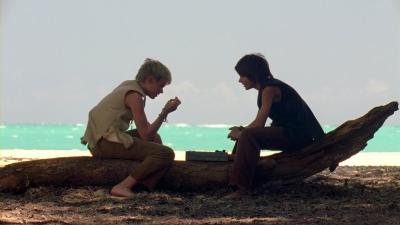
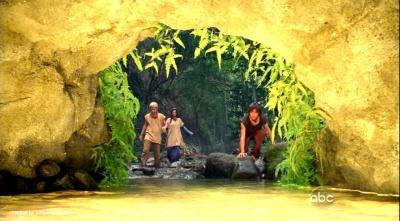
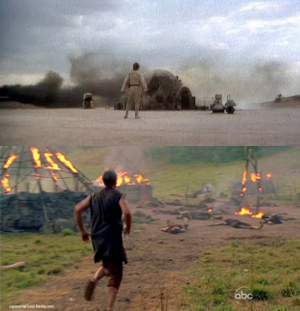
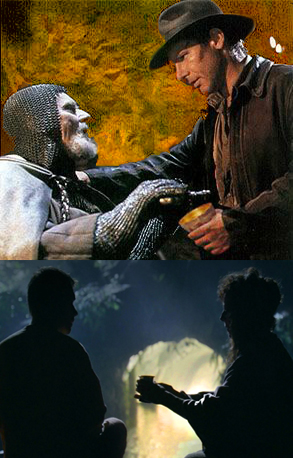
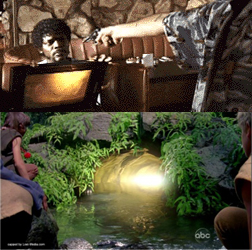
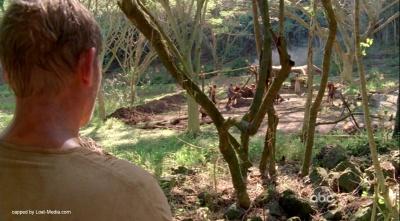
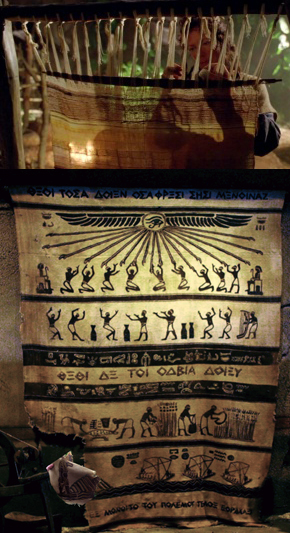
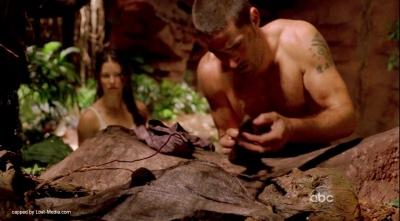



It’s a good thing all the LOST fans are willing to invest this much time and though, ’cause without it, it might seem like the writers are just bullshitting or something!
GO FLYERS!!!!!!
Even if they were, some pretty powerful storylines can come out of subconscious thought. Sometimes, making it up as you go along is the best way to tap into real truths.